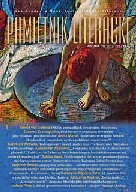„Topografia pożądania” – konstruowanie przestrzeni wokół homoseksualnych bohaterów polskiej prozy międzywojennej (Iwaszkiewicz, Choromański, Breza)
“Topography of Desire” – Constructing of Space around Homosexual Protagonists in Polish Inter-War Prose (Iwaszkiewicz, Choromański, Gombrowicz, Breza)
Author(s): Wojciech ŚmiejaSubject(s): Literary Texts
Published by: Instytut Badań Literackich Polskiej Akademii Nauk
Keywords: Witold Gombrowicz; Michał Choromański; Iwaszkiewicz; Breza; German Ritz; homosexual protagonists
Summary/Abstract: Escape to a big city is one of 19th c. literary topoi present in narrations in which the protagonist is homosexual. The topos is embedded in social-historical reality. Historical researches show that big cities as New York and Berlin were places of bringing homosexual societies together. The present article analyses the functioning of “myth of a big city” as homosexual-friendly place in Polish Inter-war literature (the author discusses well-known books, e.g. Witold Gombrowicz’s “Ferdydurke” along with forgotten ones, as e.g. Michał Choromański’s “Skandal w Wesołych Bagniskach <A Scandal at Wesołe Bagniska>)”. Referring to German Ritz’s observations, the author argues that in the case of Poland the escape in question is rather to the country, grange, or manor estate. The places to which one escapes prove to be as unfriendly and dangerous as the space of a big city, and the feeling of a greater freedom in realising one’s sexuality becomes a hazardous illusion.
Journal: Pamiętnik Literacki. Czasopismo kwartalne poświęcone historii i krytyce literatury polskiej
- Issue Year: 2012
- Issue No: 4
- Page Range: 83-99
- Page Count: 17
- Language: Polish

